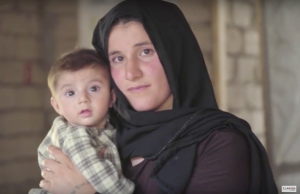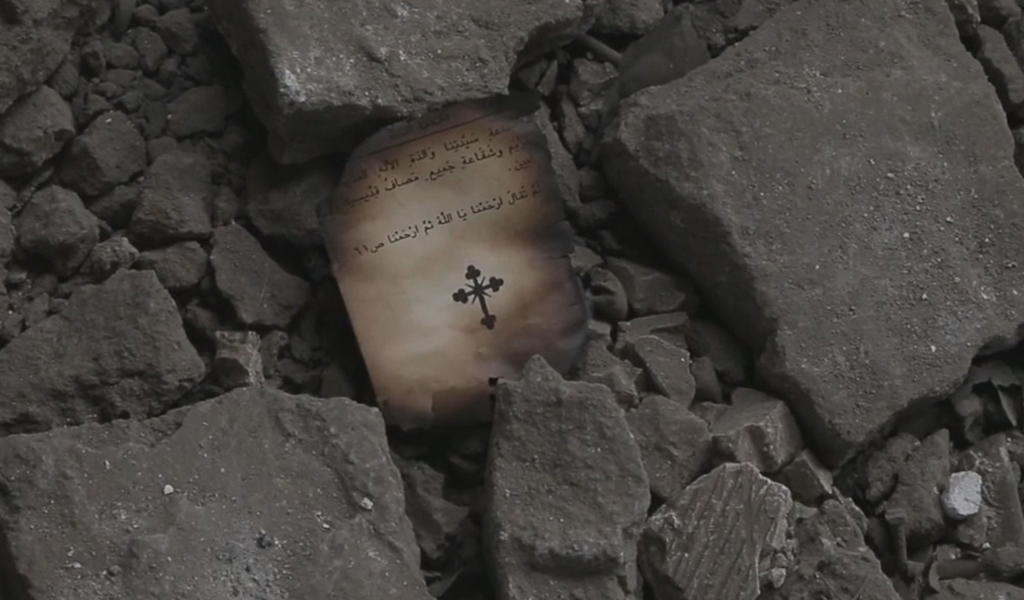Faithkeepers: Be Your Brothers’ Keeper documents genocide in the Middle East
Try to imagine for a moment that you are a woman of faith who has been dragged from her doorway, thrown into the trunk of a car and driven to a remote location. There, after being bound and having your head shaven, you are beaten, berated and repeatedly raped. Your two cell-mates – one a thirty-five-year-old physician, the other a thirteen-year-old-girl – are enduring the same abasement.
Or imagine you are a man facing a certain death by hanging – simply for holding fast to your creed? Or a child who discovers an envelope containing six bullets and a note saying, “This is what we will do to your family.”
Persecution of such magnitude may seem incredible to most – excepting the aging survivors of the Holocaust. But the horrors of what is now being described in some circles as a genocide are affecting entire communities in the Middle East.

Presenting the stories of many of these modern-day martyrs caught in the cauldron of ethnic and ideological cleansing is the Clarion Project’s latest film – Faithkeepers: Be Your Brothers’ Keeper.
Produced by Roma Downey (Touched By An Angel) and Paula Kweskin (one of the producers behind the film Honor Diaries), Faithkeepers documents the lives of Christians living in the Middle East and the absolute terror they have weathered at the hands of the so-called Islamic State (ISIS).
We attended a special screening of Faithkeepers this past Wednesday night at the Washington, D.C. office of Alliance Defending Freedom. A post-screening question and answer offered additional insights by National Security Analyst Ryan Mauro and Kelsey Zorzi: U.N. Council, ADF International.
We also had the privilege of speaking with Paula Kweskin earlier that day. Together with the film, the trio presented a grim and frustrating picture.
The film opens with a series of heart-rending recounts from men, women, and children who have seen and endured some of the worst that ISIS has to offer. Their painful stories are punctuated with illustrations depicting sectarian violence. Informational graphs, news footage, and video taken inside bombed-out churches and refugee camps help to complete the picture.
Though some remain wary of terming the present persecution of Christians as ideological genocide, the statistical evidence seems to speak for itself.

Assyrian Christian monastery ruin, frontier between Iraq and Turkey. (Wikimedia)
In 1910, for example, twenty percent of the Middle East was populated by Christians. Today that number is less than five percent. The numbers for the Jewish exodus from countries like Algeria and Iraq are even more alarming. And for 200,000 Yazidis in Iraq – a Kurdish-speaking minority which practices an ancient and unique religion – ISIS gave the ultimatum: Leave now or die.
The common thread that unites the persecuted Christians with their Jewish, Yazidi, and in some cases Islamic brothers and sisters is the demand that they publicly renounce their faith.
Not surprisingly, we are told that Muslims who convert to Christianity are often arrested, imprisoned, tortured and sentenced to die. As Mauro observed, “You know what is happening, but the gravity of the reality is overwhelming”.
At fifty-five minutes in length, Faithkeepers condenses more than a century of bloody history by using brief accounts from the past to underscore the current situation.
“It is not only ethnic, it is ideological,” said Mauro. “ISIS is just one manifestation of a greater ideology.”

Arguing ideology may seem problematic. But it is that very determination which should arrest the attention of reticent world leaders.
The faith message should also provide a springboard for reaching a larger audience.
“We are starting with a nationwide church/community screening campaign and then hopefully moving on to wider distribution. Visitors to the Faithkeepers website will find a section where they can sign their church up for a screening or learn more about a screening happening near them,” Kweskin explained.
Kweskin added that she hopes the film will motivate both Christians and community activists to reach out to their elected officials.
To date, any real action has stalled on the question: Does what ISIS is doing meet the legal definition of genocide? Faithkeepers: Be Your Brothers’ Keeper should help lay that vexing question to rest.
There is no “Happy Ending” in the film, save for the inspiration many will glean from those who would rather die than deny their beliefs. As one survivor says, “God only allows this level of hell if there is a greater miracle in store.”

Anthony C. Hayes is an actor, author, raconteur, rapscallion and bon vivant. A one-time newsboy for the Evening Sun and professional presence at the Washington Herald, Tony’s poetry, photography, humor, and prose have also been featured in Smile, Hon, You’re in Baltimore!, Destination Maryland, Magic Octopus Magazine, Los Angeles Post-Examiner, Voice of Baltimore, SmartCEO, Alvarez Fiction, and Tales of Blood and Roses. If you notice that his work has been purloined, please let him know. As the Good Book says, “Thou shalt not steal.”

